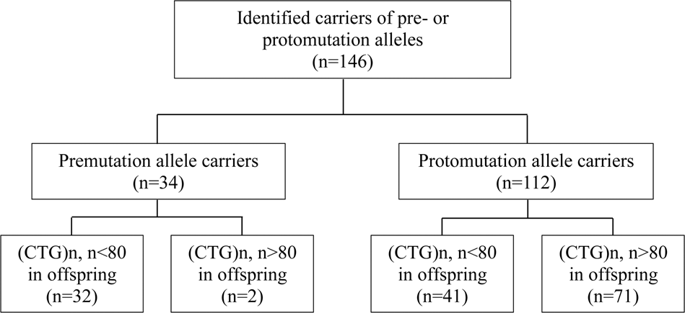European Journal of Human Genetics ( IF 5.2 ) Pub Date : 2020-03-12 , DOI: 10.1038/s41431-020-0601-4 Isis B T Joosten 1, 2 , Debby M E I Hellebrekers 3 , Bianca T A de Greef 1, 2, 4 , Hubert J M Smeets 2, 5, 6 , Christine E M de Die-Smulders 3 , Catharina G Faber 1, 2 , Monique M Gerrits 3

|
Myotonic dystrophy type 1 (DM1) is caused by a CTG trinucleotide repeat expansion on chromosome 19q13.3. While DM1 premutation (36–50 repeats) and protomutation (51–80 repeats) allele carriers are mostly asymptomatic, offspring is at risk of inheriting expanded, symptom-associated, (CTG)n repeats of n > 80. In this study we aimed to evaluate the intergenerational instability of DM1 pre- and protomutation alleles, focussing on the influence of parental gender. One hundred and forty-six parent–child pairs (34 parental premutations, 112 protomutations) were retrospectively selected from the DM1 patient cohort of the Maastricht University Medical Center+. CTG repeat size of parents and children was determined by (triplet-primed) PCR followed by fragment length analysis and Southern blot analysis. Fifty-eight out of eighty-one (71.6%) paternal transmissions led to a (CTG)n repeat of n > 80 in offspring, compared with 15 out of 65 (23.1%) maternal transmissions (p < 0.001). Repeat length instability occurred for paternal (CTG)n repeats of n ≥ 45, while maternal instability did not occur until (CTG)n repeats reached a length of n ≥ 71. Transmission of premutations caused (CTG)n repeats of n > 80 in offspring only when paternally transmitted (two cases), while protomutations caused (CTG)n repeats of n > 80 in offspring in 71 cases, of which 56 (78.9%) were paternally transmitted. In conclusion, our data show that paternally transmitted pre- and protomutations were more unstable than maternally transmitted pre- and protomutations. For genetic counseling, this implies that males with a small DMPK mutation have a higher risk of symptomatic offspring compared with females. Consequently, we suggest addressing sex-dependent factors in genetic counseling of small-sized CTG repeat carriers.
中文翻译:

父母在1型强直性营养不良中的重复长度不稳定性和原型突变。
1型强直性肌营养不良症(DM1)是由CTG三核苷酸在19q13.3染色体上的重复扩增引起的。而DM1前突变(36-50次重复)和protomutation(51-80次重复)等位基因携带者大多是无症状的,后代是在继承膨胀风险,症状相关,(CTG)ñ的重复Ñ > 80.在这项研究中,我们旨在评估DM1前和原突变等位基因的代际不稳定性,重点关注父母性别的影响。从马斯特里赫特大学医学中心+的DM1患者队列中回顾性选择了146对亲子对(34个亲代突变,112个原型突变)。父母和孩子的CTG重复大小是通过(三联体引物)PCR,片段长度分析和Southern印迹分析确定的。八十一(71.6%)的父本传播导致 后代中的(CTG)n重复n > 80,而六十(51.6%)的母婴传播中有15(p <0.001)。父亲(CTG)n发生重复长度不稳定性的重复Ñ ≥45,而母体不稳定没有发生直到(CTG)ñ重复达到的长度Ñ ≥71.引起前突变(CTG)的传输ñ重复ñ > 80后代只有当父本传递(二例),而原语引起(CTG)n次重复n次 > 80例后代病例中有71例,其中56例(78.9%)是父系传播的。总之,我们的数据表明,父本传播的前置和原型变异比母本传播的前置和原型变异更加不稳定。对于遗传咨询,这意味着DMPK突变较小的男性比女性有较高的症状后代风险。因此,我们建议在小型CTG重复携带者的遗传咨询中解决性别依赖性因素。


























 京公网安备 11010802027423号
京公网安备 11010802027423号